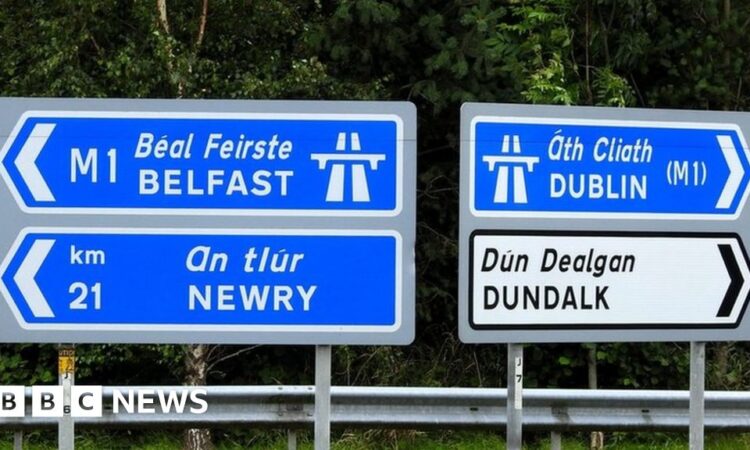
- By John Campbell
- BBC News NI economics and business editor
Image source, Getty Images
Economic concepts like subvention, productivity and identifiable expenditure are not the usual materials of political passion in Northern Ireland.
But this week they took centre stage as a new report attempted to estimate the initial costs of Irish unification.
The work by Dublin-based economists, John Fitzgerald and Edgar Morgenroth, looked at how much it costs to deliver public services in Northern Ireland and how those costs could be carried across to a unified state.
The reaction was a taster of the economic arguments for and against unification, should a border poll be called anytime soon.
Official data shows that Northern Ireland raises less in tax than it spends on public services with the gap filled by money from central government – a subvention.
All regions of the UK aside from London and the south east of England require a subvention and in Northern Ireland’s case the headline figure is usually estimated at about £10bn.
Fitzgerald and Morgenroth made some adjustments to that number; for example, subtracting Northern Ireland’s share of UK defence spending.
But they still concluded that on day one of unification, the Irish state would have to find substantial additional resources to fund public services for citizens in the northern six counties.
Their central estimate was €11bn (£9.4bn) or about 5% of Irish national income, meaning tax increases, more borrowing or spending cuts in the unified state.
Their lowest estimate was €8bn (£6.8bn) with a highest estimate of 20bn (£17.1bn), based on the assumption that public sector pay and benefits in Northern Ireland would immediately be raised to match levels in the republic.
‘Better off British’
For unionists, the numbers bolster the argument that being part of the large UK state gives Northern Ireland a degree of economic protection and that conditions would be harsher in a united Ireland.
“This report shows that we are much better off being British,” said the Traditional Unionist Voice party (TUV), adding that supporters of unity had been confronted with “cold, hard financial reality”.
An economic analysis is only as good as its underlying assumptions and across nationalism there were critiques that the assumptions in this study were limited, static and pessimistic, leading to unreliable conclusions.
In a social media post, the SDLP’s Stormont leader, Matthew O’Toole, said it is important that those who favour Irish unity should not present “blithely optimistic pictures” nor should “self-evidently motivated, even jaundiced, political and diplomatic assumptions be bolted onto what purports to be an economic analysis”.
His point being that when considering a post-referendum negotiation on the terms on which Northern Ireland would leave the UK the study “appears designed to present the most pessimistic case”.
Another major plank of criticism is that the analysis did not really attempt to engage with the possibility that Northern Ireland’s economic performance could improve as it was integrated with the Republic.
One current major difference between the two economies is productivity, a measurement of the amount of economic output generated by each worker.
In the long-term, rising profits, wages and living standards are dependent on rising productivity.
Northern Ireland productivity
The contention for advocates of unity is that if Northern Ireland’s productivity performance converged even partially then worries about the subvention would start to go away.
Prof John Doyle, a political scientist at Dublin City University, said the analysis by Fitzgerald and Morgenroth only considers this in a superficial way.
“The report mentions the possibility of economic change, but the headline figures assume no change at all. The UK is a highly-centralised economy, with only London producing a fiscal surplus.
There is no trajectory of ‘catching up’ for Northern Ireland or indeed other UK regions.
“There is no reason to believe that with the same tax and policy model as the south that Northern Ireland would remain such a weak economy, compared to say Cork and Kerry.
“If they reached that level no subvention would be required, and productivity, wages and living standards would improve.”
Image source, omersukrugoksu
Prof Morgenroth remains unconvinced by this “productivity catch-up” idea, pointing to the experience of German unification where, 30 years on, productivity differences persist and the eastern part of the country continues to receive big fiscal transfers.
What we have heard this week is not the last word on the economics of unification.
In fact the last few years have seen a serious academic engagement with cross-border issues as well as the possibilities of constitutional change and its economic implications.
Two separate projects have funded research on a range of topics.
The Irish government’s Shared Island Unit has produced analysis on areas of cross border cooperation like education and services.
The ARINS project, a joint initiative of the Royal Irish Academy and the University of Notre Dame, has produced a series of reports on economic issues like the subvention, social security, education and quality of life.
Expect more work in these areas and more debate.






